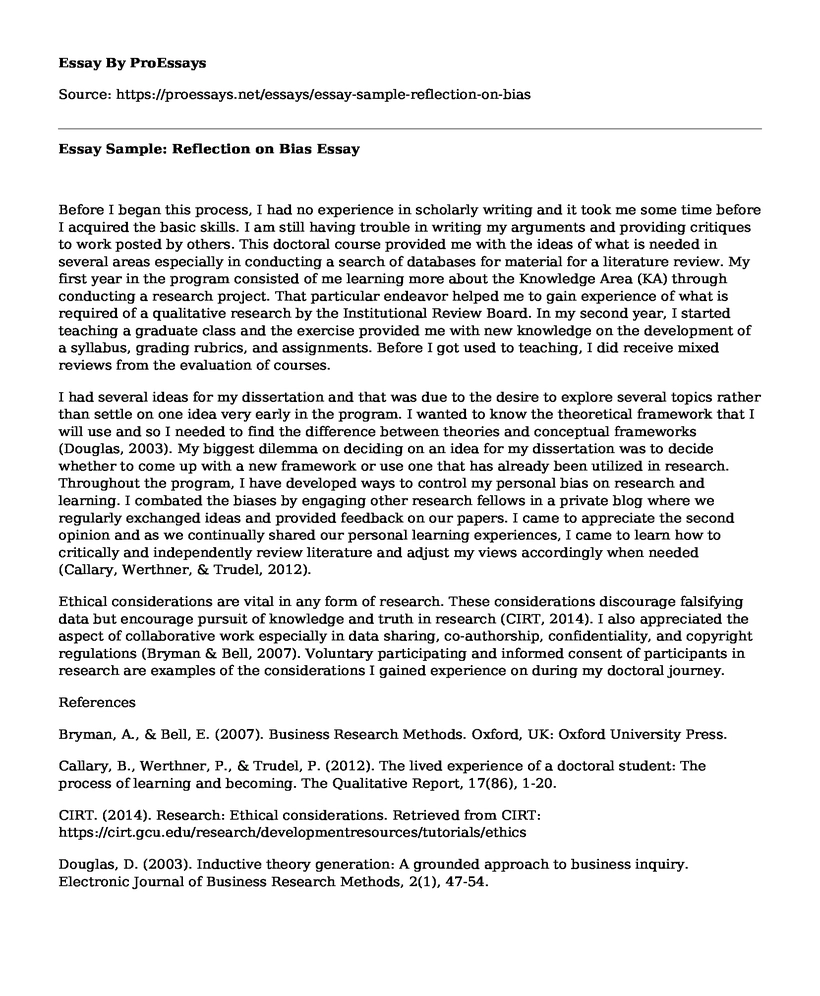Before I began this process, I had no experience in scholarly writing and it took me some time before I acquired the basic skills. I am still having trouble in writing my arguments and providing critiques to work posted by others. This doctoral course provided me with the ideas of what is needed in several areas especially in conducting a search of databases for material for a literature review. My first year in the program consisted of me learning more about the Knowledge Area (KA) through conducting a research project. That particular endeavor helped me to gain experience of what is required of a qualitative research by the Institutional Review Board. In my second year, I started teaching a graduate class and the exercise provided me with new knowledge on the development of a syllabus, grading rubrics, and assignments. Before I got used to teaching, I did receive mixed reviews from the evaluation of courses.
I had several ideas for my dissertation and that was due to the desire to explore several topics rather than settle on one idea very early in the program. I wanted to know the theoretical framework that I will use and so I needed to find the difference between theories and conceptual frameworks (Douglas, 2003). My biggest dilemma on deciding on an idea for my dissertation was to decide whether to come up with a new framework or use one that has already been utilized in research. Throughout the program, I have developed ways to control my personal bias on research and learning. I combated the biases by engaging other research fellows in a private blog where we regularly exchanged ideas and provided feedback on our papers. I came to appreciate the second opinion and as we continually shared our personal learning experiences, I came to learn how to critically and independently review literature and adjust my views accordingly when needed (Callary, Werthner, & Trudel, 2012).
Ethical considerations are vital in any form of research. These considerations discourage falsifying data but encourage pursuit of knowledge and truth in research (CIRT, 2014). I also appreciated the aspect of collaborative work especially in data sharing, co-authorship, confidentiality, and copyright regulations (Bryman & Bell, 2007). Voluntary participating and informed consent of participants in research are examples of the considerations I gained experience on during my doctoral journey.
References
Bryman, A., & Bell, E. (2007). Business Research Methods. Oxford, UK: Oxford University Press.
Callary, B., Werthner, P., & Trudel, P. (2012). The lived experience of a doctoral student: The process of learning and becoming. The Qualitative Report, 17(86), 1-20.
CIRT. (2014). Research: Ethical considerations. Retrieved from CIRT: https://cirt.gcu.edu/research/developmentresources/tutorials/ethics
Douglas, D. (2003). Inductive theory generation: A grounded approach to business inquiry. Electronic Journal of Business Research Methods, 2(1), 47-54.
Cite this page
Essay Sample: Reflection on Bias. (2021, Apr 08). Retrieved from https://proessays.net/essays/essay-sample-reflection-on-bias
If you are the original author of this essay and no longer wish to have it published on the ProEssays website, please click below to request its removal:
- Open Distance Learning
- Family Therapy: The Parent-Child Relationship and the Development of Secure Attachment in Young Children
- Paper Example on Standardized Testing
- Essay Example on Audiobooks: A Powerful Tool for Adult English Learners
- Essay Example on the Boy Raised as a Dog: Traumatized Kids' Stories of Loss, Love, & Healing
- Mastery Learning: Unlocking Students' Potential Beyond Grades - Research Paper
- Essay Example on Changes in NYS English Learning for ELL Students: 4 Ways to Identify, Support, Help







